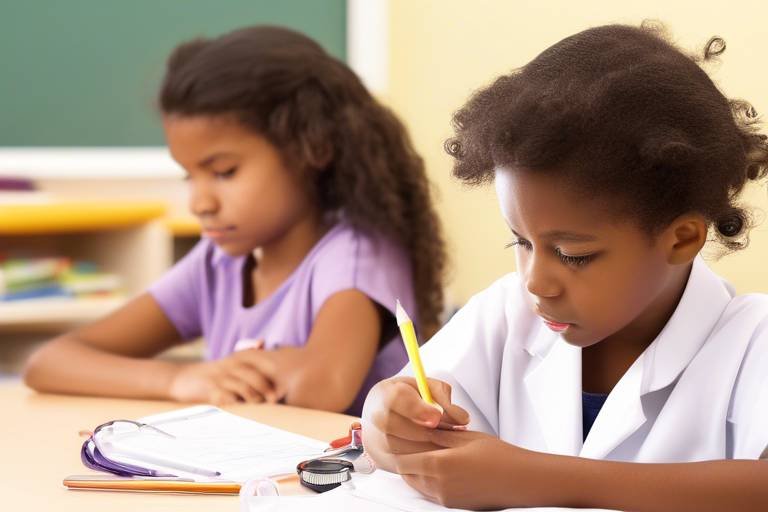Preparing for the New School Year: Health Check-up Guide
As summer winds down and the excitement of a new school year approaches, it’s essential to focus on one of the most critical aspects of your child’s readiness: their health. Preparing for the new school year isn’t just about buying new school supplies or picking out the perfect backpack; it’s also about ensuring that your child is physically and mentally fit to tackle the challenges ahead. A comprehensive health check-up can act as a solid foundation for a successful academic year, helping to identify any potential health issues before they become significant problems. So, what should you consider when planning these health assessments? Let’s dive into the importance of health check-ups and how they can set the stage for a thriving school year.
Regular health check-ups are not just a routine; they are a vital part of a student’s overall well-being. Think of these assessments as a tune-up for a car; just like a car needs regular maintenance to run smoothly, our bodies require the same attention to function optimally. Early detection of potential health issues can lead to better management and treatment, ultimately supporting academic success. Studies have shown that students who are in good health tend to perform better in school. They are more focused, have higher energy levels, and are less likely to miss school due to illness. Therefore, making health check-ups a priority can significantly impact your child’s educational journey.
Understanding the various health screenings required for students is crucial for parents. Each screening plays a specific role in maintaining your child’s health and ensuring they are ready to learn. Here’s a quick rundown of the most common screenings and their significance:
- Vision and Hearing Tests: Essential for learning, as both senses are critical for classroom engagement.
- Immunization Updates: Keeping vaccinations current prevents outbreaks and protects the health of all students.
- Physical Fitness Evaluations: Helps assess a child's physical well-being and readiness for physical activities.
Vision and hearing are fundamental to a child’s ability to learn effectively. Imagine trying to read a textbook with blurry vision or struggling to understand a teacher’s instructions due to hearing difficulties. These challenges can severely impact a student’s performance in school. Regular vision and hearing tests can catch any issues early on, allowing for timely interventions. If your child has trouble seeing the board or frequently asks you to repeat things, it might be time for a check-up.
Recognizing signs of vision issues early can prevent learning difficulties. Some key indicators that parents should watch for include:
- Squinting or tilting the head to see better
- Frequent eye rubbing or tearing
- Difficulty reading the board or printed materials
- Complaints of headaches after reading or studying
Hearing plays a vital role in communication and learning. If a child cannot hear properly, they may struggle to follow along in class or miss important information. Regular hearing assessments are essential to ensure that students can fully engage with their learning environment. Early detection of hearing issues can lead to effective solutions, such as hearing aids or other interventions, which can significantly improve a child’s educational experience.
Staying up-to-date with immunizations is crucial for student health. Vaccinations protect not only your child but also their classmates, teachers, and the broader community. Schools often require specific vaccinations to prevent outbreaks of contagious diseases. Being proactive about immunizations can help ensure that your child is healthy and ready to learn without the risk of illness disrupting their education.
Physical fitness is an integral part of a student’s overall health. Regular physical activity is linked to improved academic performance, better mood, and enhanced concentration. Fitness evaluations can help determine if your child is meeting the recommended activity levels and can guide you in making necessary adjustments to their routine.
Regular exercise has numerous benefits for students, including improved focus and reduced stress. Think of exercise as a natural energy booster that sharpens the mind and prepares the body for the day ahead. When students engage in physical activities, they not only enhance their physical health but also their mental well-being, making them better equipped to handle the demands of school.
Nutrition plays a vital role in a student’s health and academic success. A balanced diet fuels the brain and body, providing the necessary nutrients for optimal learning and growth. Parents should encourage healthy eating habits by incorporating a variety of fruits, vegetables, whole grains, and proteins into their child's diet. Remember, just like a car needs the right fuel to run efficiently, our bodies require nutritious food to function at their best.
Q: How often should my child have a health check-up?
A: It’s recommended that children have a health check-up at least once a year, but more frequent visits may be necessary depending on individual health needs.
Q: What vaccinations does my child need before school?
A: Common vaccinations include MMR (measles, mumps, rubella), DTaP (diphtheria, tetanus, pertussis), and varicella (chickenpox). Check with your local health department for specific requirements.
Q: What should I do if my child shows signs of vision or hearing problems?
A: If you notice any signs of vision or hearing issues, schedule an appointment with a healthcare professional as soon as possible for a comprehensive assessment.

Importance of Health Check-ups
As the new school year approaches, one of the most crucial steps parents can take is ensuring their children undergo regular health check-ups. These assessments are not just a formality; they are essential for identifying potential health issues before they escalate. Imagine embarking on a long journey without checking your vehicle's oil or tires—similarly, sending your child off to school without a thorough health evaluation can lead to unforeseen challenges. Regular health check-ups serve as a proactive measure, allowing parents to catch any developing health concerns early and ensuring their children are in optimal condition to tackle academic challenges.
Moreover, health check-ups are integral to a child's overall well-being. They provide an opportunity for healthcare providers to assess physical health, monitor growth and development, and offer guidance on nutrition and lifestyle choices. This holistic approach is vital because a healthy child is more likely to succeed academically and socially. When students feel good physically, they are more engaged in class, participate actively in extracurricular activities, and develop stronger relationships with peers. In essence, health check-ups are the foundation upon which a successful school year is built.
But what exactly should these health check-ups include? Here are some key components that should be part of your child's health assessment:
- Physical Examination: A thorough physical exam helps identify any underlying health issues that could affect your child's performance.
- Vision and Hearing Tests: These tests are crucial since undetected problems can hinder learning and communication.
- Immunization Updates: Keeping vaccinations current is essential for preventing outbreaks of contagious diseases in schools.
- Nutritional Assessment: Understanding your child's dietary habits can provide insights into their overall health and energy levels.
Furthermore, the importance of health check-ups extends beyond just physical health. Mental health is equally critical, especially in a school environment where stress and anxiety can impact a child's ability to learn. Regular check-ups can include mental health screenings, allowing parents to address any emotional or psychological challenges their children may face. By fostering a comprehensive approach to health, parents can ensure their children are not only physically fit but also mentally resilient, ready to face the academic year ahead.
In conclusion, prioritizing health check-ups as part of your back-to-school preparation can significantly impact your child's academic journey. By investing time and resources into these assessments, parents are essentially equipping their children with the tools they need to thrive in school. So, as you gear up for the new school year, remember that a little attention to health can go a long way in ensuring your child’s success!

Recommended Health Screenings
As the new school year approaches, it's crucial for parents and guardians to be proactive about their child's health. serve as a vital tool in identifying potential health issues before they escalate. These assessments not only help in ensuring that children are physically fit for school activities but also play a significant role in their overall academic performance. By understanding the various health screenings that are recommended, parents can better prioritize their child's health and well-being.
One of the most important screenings to consider is the annual physical exam. This comprehensive evaluation allows healthcare providers to assess a child's growth, development, and overall health status. During this visit, doctors can check vital signs, measure height and weight, and conduct a thorough examination to identify any underlying health concerns. Additionally, this is a great opportunity for parents to discuss any specific health issues or questions they might have regarding their child's health.
In addition to the physical exam, there are several other essential screenings that should be included in your child's health check-up. These include:
- Vision Tests: Regular eye exams are crucial since undiagnosed vision problems can lead to learning difficulties.
- Hearing Tests: Hearing assessments help ensure that children can effectively communicate and engage in classroom activities.
- Body Mass Index (BMI) Screening: Monitoring BMI can help identify potential weight-related health issues early on.
- Cholesterol and Blood Pressure Checks: These tests are essential for assessing cardiovascular health, especially if there is a family history of heart disease.
Moreover, many schools require certain health screenings to be completed before students can participate in sports or other physical activities. This requirement underscores the importance of these evaluations in promoting not just academic success but also physical fitness. Parents should keep abreast of their school district's specific health screening requirements to ensure compliance.
To further illustrate the significance of these screenings, consider the following table that outlines the recommended age for various health assessments:
| Health Screening | Recommended Age |
|---|---|
| Annual Physical Exam | Every Year |
| Vision Test | Starting at Age 3 |
| Hearing Test | Starting at Age 4 |
| BMI Screening | Starting at Age 2 |
| Cholesterol Check | Starting at Age 9 |
| Blood Pressure Check | Starting at Age 3 |
In conclusion, being aware of and adhering to recommended health screenings can make a world of difference in your child’s educational journey. These assessments not only help in catching potential health issues early but also ensure that your child is physically and mentally prepared for the challenges of the school year. So, as you gear up for the new academic year, make sure that your child is on track with their health screenings. After all, a healthy child is a happy learner!

Vision and Hearing Tests
When it comes to education, vision and hearing are two of the most crucial senses that students rely on every single day. Imagine trying to learn in a classroom where you can't see the board clearly or hear the teacher's instructions. It’s like trying to read a book with pages missing—frustrating and ineffective! That's why regular vision and hearing tests are not just recommended; they are essential for ensuring that students are set up for success.
Many parents might wonder, "How often should my child get these tests?" The answer varies, but it's generally advised that children undergo vision and hearing screenings at least once a year. These tests can help identify any issues early on, allowing for timely intervention. For instance, if a child is struggling to see the board, it could lead to falling behind in class, which can be incredibly discouraging and impact their overall academic performance.
So, what exactly do these tests entail? Vision tests often include assessments of visual acuity, depth perception, and eye coordination. Hearing tests, on the other hand, check for the ability to hear sounds at different frequencies and volumes. Both tests are quick and painless, but the benefits they provide can be life-changing. Here’s a breakdown of what you can expect:
| Test Type | What to Expect | Why It's Important |
|---|---|---|
| Vision Test | Eye chart reading, depth perception checks | Identifies issues like nearsightedness or farsightedness |
| Hearing Test | Listening to sounds at various pitches and volumes | Detects hearing loss that could affect learning |
Recognizing the signs of potential vision or hearing problems is also crucial. For example, if your child frequently squints at the board or complains about headaches after reading, it might be time for a check-up. Similarly, if they often ask for things to be repeated or seem to struggle in noisy environments, these could be indicators of hearing issues. By staying vigilant and proactive, parents can help avoid unnecessary academic struggles.
In conclusion, prioritizing is an investment in your child's future. These simple screenings can make a significant difference in their academic journey, ensuring they have the tools they need to thrive. So, make it a point to schedule these important check-ups at the start of the school year, and give your child the best chance for success!
Q: How often should my child have vision and hearing tests?
A: It's recommended that children undergo these tests at least once a year, but consult your healthcare provider for personalized advice.
Q: What are the signs that my child might need a vision test?
A: Signs include squinting, difficulty reading the board, headaches after reading, or complaints of blurry vision.
Q: How can hearing issues affect my child's learning?
A: Hearing problems can lead to difficulties in understanding instructions, participating in discussions, and following along in class, which can hinder academic performance.

Signs of Vision Problems
Recognizing the in your child is crucial for ensuring they have a successful school year. Just like a car needs regular maintenance to run smoothly, our eyes require attention to function well, especially in a learning environment. Poor vision can lead to a myriad of challenges, from struggling to read the board to feeling fatigued after a long day of classes. So, how can you tell if your child might be experiencing vision issues? Here are some key indicators to watch for:
- Squinting: If you notice your child squinting frequently, it could be their way of trying to see better. This is a common sign that they may be having difficulty focusing.
- Eye rubbing: Excessive rubbing of the eyes can indicate strain or discomfort, which often stems from vision problems.
- Close sitting: If your child tends to sit too close to the television or holds books very close to their face, it might be a sign that they are struggling to see clearly.
- Frequent headaches: Complaints of headaches, especially after doing homework or reading, can be linked to vision strain.
- Difficulty with reading: If your child is having trouble keeping their place while reading or often loses focus, it might be due to vision issues.
Additionally, changes in behavior can also be a clue. If your child seems to avoid activities that require visual skills, such as playing sports or reading, it may be time to schedule an eye exam. It’s important to remember that early detection of vision problems can significantly improve a child’s learning experience. Just like a gardener nurtures a plant to help it grow strong, addressing vision concerns early can help your child thrive academically.
In conclusion, keeping an eye out for these signs can make a world of difference in your child's educational journey. If you suspect any vision issues, don’t hesitate to consult with an eye care professional. After all, a clear vision leads to a clearer path in learning!
Q: How often should my child have their eyes checked?
A: It’s recommended that children have their eyes examined every one to two years, or more frequently if they show signs of vision problems.
Q: What age should my child have their first eye exam?
A: The American Academy of Ophthalmology suggests that children should have their first comprehensive eye exam at around six months of age, followed by exams at age three and before starting school.
Q: Can vision problems affect my child's learning?
A: Yes, undiagnosed vision problems can lead to difficulties in reading, writing, and overall academic performance.
Q: What should I do if my child shows signs of vision problems?
A: Schedule an appointment with an eye care professional as soon as possible for a comprehensive eye examination.

Importance of Hearing Assessments
When it comes to a student's ability to learn and thrive in school, hearing assessments are often overlooked yet incredibly crucial. Imagine trying to absorb information in a classroom filled with chatter and noise, only to realize that you can’t hear the teacher clearly. This scenario is more common than you might think, and it can significantly impact a student's academic performance and social interactions. Regular hearing evaluations can help identify any potential issues before they escalate, ensuring that students can fully engage in their learning environment.
Hearing assessments are essential for several reasons. First and foremost, they help in detecting hearing loss or impairments that might not be immediately obvious. Many children may not even realize they have a hearing problem, as they often adapt their behaviors to compensate for what they can’t hear. This can lead to frustration, low self-esteem, and even behavioral issues in the classroom. Furthermore, untreated hearing problems can hinder a child's ability to follow instructions, participate in discussions, and enjoy social interactions with peers.
In addition to identifying hearing issues, these assessments can also track the effectiveness of any interventions or treatments. For instance, if a child is fitted with hearing aids, regular follow-ups can determine how well they are working and if any adjustments are needed. This ongoing monitoring is vital for ensuring that students receive the full benefit of their auditory support.
Moreover, hearing assessments can play a significant role in communication skills. Good hearing is essential for language development and literacy. Children who struggle to hear may find it challenging to grasp new vocabulary or understand complex sentence structures, which can affect their reading and writing abilities. In a world where communication is key, ensuring that children can hear well is an investment in their future.
To sum it up, hearing assessments are not just about identifying problems; they are about paving the way for a brighter, more successful educational journey. Parents should prioritize these evaluations as part of their child's health check-ups, ensuring that any hearing issues are addressed promptly. After all, a child who can hear well is a child who can learn well!
- What age should my child have their first hearing assessment?
It’s recommended that children have their first hearing assessment by the age of three, and then regularly as they grow older, especially before starting school. - How often should hearing assessments be conducted?
Children should have their hearing checked at least once a year, or more frequently if they show signs of hearing issues or if they are at risk. - What are the signs that my child may need a hearing assessment?
Signs include difficulty following directions, asking for repetition frequently, or seeming to ignore conversations.

Immunization Requirements
When it comes to preparing for the new school year, one of the most crucial aspects that often gets overshadowed is the importance of immunizations. Keeping your child's vaccinations up-to-date is not just a matter of compliance; it's a vital step in ensuring their health and the health of their peers. Vaccines protect against a variety of serious diseases that can easily spread in crowded school environments. Think of it as a shield that helps your child fend off illnesses that could sidetrack their academic journey.
In many regions, schools require specific immunizations before students can enroll. These requirements can vary, but generally include vaccinations for diseases such as measles, mumps, rubella, and varicella (chickenpox). By adhering to these guidelines, you not only comply with school regulations but also contribute to the community's overall health. When a significant percentage of the population is vaccinated, it creates herd immunity, which protects those who cannot be vaccinated due to medical reasons.
To give you a clearer picture, here's a
| Vaccine | Recommended Age | Diseases Prevented |
|---|---|---|
| MMR (Measles, Mumps, Rubella) | 12-15 months, 4-6 years | Measles, Mumps, Rubella |
| Varicella (Chickenpox) | 12-15 months, 4-6 years | Chickenpox |
| DTP (Diphtheria, Tetanus, Pertussis) | 2, 4, 6 months, 15-18 months, 4-6 years | Diphtheria, Tetanus, Pertussis |
| Hepatitis B | Birth, 1-2 months, 6-18 months | Hepatitis B |
It's essential to keep a record of your child's immunizations. Many parents find it helpful to maintain a vaccination schedule or chart that outlines when each vaccine was administered. This not only helps during school enrollment but also serves as a reminder for upcoming vaccinations. If you're unsure about your child's vaccination status, consult your pediatrician; they can provide guidance and help you catch up on any missed shots.
Additionally, some schools may also require a health form signed by a healthcare provider, indicating that your child is up-to-date on their vaccinations. This form is often a prerequisite for enrollment, so it's a good idea to get this sorted out well before the school year begins. Remember, the goal is to create a safe and healthy learning environment for all students. By ensuring your child is vaccinated, you are playing a significant role in achieving that goal.
In conclusion, immunizations are not just a checkbox on a school form; they are an essential part of your child's health and well-being. By prioritizing their vaccinations, you're setting them up for a successful and uninterrupted school year. So, as you prepare for the upcoming academic season, don't forget to include a trip to the doctor's office for that all-important immunization check!
- What vaccines are required for school enrollment? - Most schools require vaccinations against measles, mumps, rubella, varicella, and DTP.
- How can I find out if my child is up-to-date on vaccinations? - Check with your pediatrician or review your child's vaccination records.
- What should I do if my child has missed a vaccination? - Schedule an appointment with your healthcare provider to catch up on missed vaccinations.
- Are there exemptions from vaccinations? - Yes, some states allow medical or religious exemptions, but it's essential to check local regulations.

Physical Fitness Evaluations
When it comes to preparing for a new school year, one aspect that often gets overlooked is . These assessments are not just a formality; they play a crucial role in understanding a student's overall health and well-being. Think of it like tuning up a car before a long road trip. Just as you wouldn’t want to hit the highway without ensuring your vehicle is in prime condition, students should also be in top shape before diving into a new academic year.
Physical fitness evaluations help identify a student's strengths and weaknesses in various physical activities. They can reveal important information about a child's endurance, flexibility, strength, and overall physical health. These evaluations can be tailored to meet the needs of each student, ensuring that every child gets the attention they deserve. By focusing on fitness, we not only enhance physical health but also promote mental clarity and emotional stability, which are essential for academic success.
Moreover, regular fitness evaluations provide a benchmark for students and their parents. They can track progress over time, celebrate improvements, and set new goals. This is particularly important for children and adolescents, who are constantly growing and changing. A well-structured fitness evaluation can include various components, such as:
- Cardiovascular endurance: Assessing how well the heart and lungs supply oxygen during physical activity.
- Muscle strength: Evaluating the strength of major muscle groups.
- Flexibility: Measuring the range of motion in joints.
- Body composition: Understanding the ratio of fat to lean mass in the body.
These evaluations can be conducted in schools by qualified physical education teachers or health professionals. The results can help in creating personalized fitness plans that cater to each student's unique needs. For instance, if a student struggles with endurance, their plan might include more cardiovascular activities, such as running or swimming, to build stamina. On the other hand, if flexibility is an issue, incorporating yoga or stretching exercises could be beneficial.
Furthermore, the benefits of regular exercise extend beyond physical health. Research shows that students who engage in regular physical activity tend to perform better academically. Exercise releases endorphins, which can enhance mood and reduce stress levels. This means that by prioritizing physical fitness, we’re not just preparing students physically but also mentally for the challenges of a new school year.
In conclusion, physical fitness evaluations are a vital component of a student's health check-up. They help identify areas for improvement, set goals, and promote a culture of health and wellness in schools. As the new school year approaches, it's essential for parents and educators to recognize the importance of these evaluations. After all, a healthy student is a happy and successful student!
Q: How often should physical fitness evaluations be conducted?
A: Ideally, physical fitness evaluations should be conducted at least once a year, but more frequent assessments can help track progress and adjust fitness plans as needed.
Q: What should students do to prepare for their fitness evaluations?
A: Students should maintain a regular exercise routine leading up to the evaluations, stay hydrated, and get plenty of rest to ensure they perform at their best.
Q: Are fitness evaluations only for athletes?
A: No, fitness evaluations are beneficial for all students, regardless of their athletic ability. They help everyone understand their physical health and set personal fitness goals.

Benefits of Regular Exercise
When it comes to gearing up for the new school year, one of the most powerful tools in a student's arsenal is regular exercise. You might wonder, how can something as simple as moving our bodies make such a big difference? Well, let me tell you—exercise is like a secret weapon for students! Not only does it help in keeping our bodies fit, but it also has a profound impact on our mental health and academic performance.
First off, let's talk about focus. Picture this: you’re sitting in class, and your mind starts to drift off. Sound familiar? Regular physical activity can actually enhance your concentration levels. Studies have shown that students who engage in consistent exercise tend to have better attention spans. It's as if exercise clears the fog from your mind, allowing you to absorb information more effectively. Think of it as sharpening a pencil before writing; a sharper pencil makes for clearer, more precise writing!
Moreover, exercise is a fantastic way to reduce stress. School can be overwhelming, with assignments piling up and exams looming around the corner. Engaging in physical activities releases endorphins, also known as the body’s natural feel-good hormones. These endorphins can help alleviate feelings of anxiety and depression, making it easier for students to tackle their academic challenges with a positive mindset. So, instead of reaching for that sugary snack when stress hits, how about a quick jog or a dance session?
Now, let's not forget about the physical health benefits. Regular exercise strengthens the heart, improves circulation, and boosts the immune system. This means fewer sick days and more time spent in class learning and growing. To illustrate, here’s a quick table summarizing some key physical benefits of exercise:
| Benefit | Description |
|---|---|
| Improved Cardiovascular Health | Regular exercise strengthens the heart, allowing it to pump blood more efficiently. |
| Enhanced Immune Function | Physical activity boosts the immune system, helping to fend off illnesses. |
| Increased Energy Levels | Exercise improves stamina and reduces fatigue, keeping students energized throughout the day. |
But wait, there’s more! Exercise also fosters social skills. Whether it’s through team sports or group workouts, students learn to communicate, collaborate, and build friendships. These social interactions are essential for developing interpersonal skills that are invaluable in both school and life. Think of it as building a network of support that can help you through tough times.
In summary, the benefits of regular exercise extend far beyond just physical fitness. It enhances focus, reduces stress, supports physical health, and builds social connections. So, as you prepare for the new school year, consider incorporating some form of physical activity into your daily routine. Whether it’s a brisk walk, a fun dance class, or joining a sports team, remember that every little bit counts. Your body and mind will thank you!
- How much exercise should students aim for each week? Students should aim for at least 60 minutes of moderate to vigorous physical activity daily.
- Can exercise really help with academic performance? Yes, regular exercise can improve focus, memory, and overall cognitive function, all of which contribute to better academic performance.
- What types of exercise are best for students? A mix of aerobic activities (like running or swimming), strength training (like push-ups or lifting weights), and flexibility exercises (like yoga) is ideal.

Nutrition and Healthy Eating
When it comes to preparing for the new school year, one of the most important aspects that often gets overlooked is nutrition. Imagine your child as a car; just like a car needs fuel to run smoothly, students need the right nutrients to fuel their brains and bodies for optimal performance. A balanced diet not only supports physical growth but also enhances cognitive abilities, making it crucial for academic success. It's fascinating how what we eat can directly influence our mood, focus, and energy levels!
So, what constitutes a balanced diet for school-aged children? Generally, it includes a variety of food groups that provide essential vitamins and minerals. Here’s a quick breakdown:
- Fruits and Vegetables: Aim for a colorful plate! Different colors represent different nutrients. For instance, orange and yellow fruits like oranges and bananas are rich in Vitamin C and potassium, while leafy greens provide iron and calcium.
- Whole Grains: Foods like brown rice, whole wheat bread, and oats are packed with fiber, which aids digestion and keeps kids feeling full longer.
- Protein: Lean meats, fish, eggs, beans, and nuts are excellent sources of protein, necessary for growth and repair of tissues.
- Dairy: Low-fat milk, yogurt, and cheese are great sources of calcium, which is vital for developing strong bones.
Incorporating these food groups into your child’s daily meals can be a game-changer. Not only does it help in maintaining a healthy weight, but it also boosts their immune system, reducing the chances of falling ill during the school year. Plus, a well-nourished child is more likely to have the energy to engage in physical activities, which is another essential component of a healthy lifestyle.
But let’s be honest—getting kids to eat healthy can sometimes feel like an uphill battle. They might prefer sugary snacks over fruits or find vegetables unappealing. Here are some creative strategies to make healthy eating more enticing:
- Involve Them: Let your kids help in the kitchen. When they participate in meal prep, they’re more likely to try new foods.
- Make It Fun: Present food in fun shapes or colors. For example, use cookie cutters to create fun shapes out of fruits and vegetables.
- Healthy Snacks: Stock up on healthy snacks like yogurt, nuts, and fruits. Having these readily available makes it easier for kids to make better choices.
Furthermore, it's essential to educate children about the importance of nutrition. Simple conversations about how different foods affect their bodies can inspire them to make healthier choices. For instance, explaining that eating a nutritious breakfast can lead to better concentration in class can motivate them to start their day with a wholesome meal.
Lastly, don’t forget about hydration! Water is crucial for maintaining energy levels and concentration. Encourage your kids to drink plenty of water throughout the day, especially during school hours. You could even make it a fun challenge to see who can drink the most water in a day!
In summary, proper nutrition and healthy eating habits are foundational elements for a successful school year. By prioritizing a balanced diet, you're not just supporting your child's physical health; you're setting them up for academic success and emotional well-being. Remember, it’s all about balance and making small, sustainable changes that can lead to lasting healthy habits.
Q1: How can I encourage my child to eat more fruits and vegetables?
A1: Involve them in shopping and cooking, and make it fun by presenting food in creative ways. You can also try smoothies or fruit popsicles to make them more appealing!
Q2: What are some quick healthy snack ideas for school?
A2: Consider options like yogurt, trail mix, fruit slices with nut butter, or whole-grain crackers with cheese. These are nutritious and easy to pack!
Q3: How much water should my child drink daily?
A3: A general guideline is about 7-8 cups (or 1.5 to 2 liters) of water per day, but this can vary based on activity level and age. Encourage them to drink water regularly throughout the day.
Q4: Are there any foods I should avoid?
A4: Try to limit sugary snacks, sodas, and processed foods. Instead, focus on whole, nutrient-dense foods that provide lasting energy.
Frequently Asked Questions
- Why are health check-ups important for students?
Health check-ups are essential for identifying potential health issues early on. They help ensure that students are physically and mentally prepared for the academic year, which can significantly impact their performance and overall well-being.
- What health screenings should my child undergo before school starts?
Common health screenings include vision and hearing tests, immunizations, and physical fitness evaluations. Each of these screenings plays a crucial role in ensuring your child is healthy and ready to learn.
- How can I tell if my child has a vision problem?
Look for signs such as squinting, holding books too close, or complaints about blurry vision. If you notice any of these indicators, it’s important to schedule a vision test with an eye care professional.
- Why are hearing assessments necessary?
Hearing is vital for effective communication and learning. Regular hearing assessments can help identify any issues that might hinder your child’s ability to participate fully in classroom activities.
- What immunizations are required for school?
Immunizations vary by state and age, but generally include vaccines for measles, mumps, rubella, chickenpox, and tetanus. Staying up-to-date with these vaccinations is crucial for preventing outbreaks in schools.
- What are the benefits of physical fitness evaluations?
Physical fitness evaluations help assess your child's overall health and fitness level. They can identify areas for improvement and encourage a lifestyle that includes regular physical activity, which is essential for both physical and mental health.
- How does regular exercise affect academic performance?
Regular exercise can improve focus, reduce stress, and boost mood, all of which contribute to better academic performance. It’s like giving your brain a workout while keeping your body fit!
- What role does nutrition play in a student’s health?
Nutrition is fundamental to a student’s health and academic success. A balanced diet provides the necessary nutrients that support cognitive function, concentration, and energy levels, helping students perform their best in school.



















